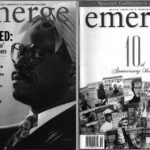By Marcel Schwantes
Inc., January 21, 2019 —
You’ve heard the definition of insanity, right? Doing the same thing over and over and expecting different results. Yet here we are in 2019, still interviewing like it was 1989.
Hiring managers, in fact, embarrassingly still ask salary history questions like, “How much did you make at your last job?” even though a new law was passed making it illegal to probe.
Worse, they’ll ask questions like “Why should I hire you?” and “What are your strengths and weaknesses?” and then base their hiring decisions on a hunch.

To upgrade one’s interview skills on the employer side, here are several techniques that will protect a company from potential bad hires.
Lose the résumé to weed out potential jerks.
You can do what Chieh Huang, co-founder and CEO of Boxed, does. The only question he asks in an interview is one to weed out potential jerks: “Tell me the story of you, but the thing you can’t say is anything that’s on your résumé.”
He’s listening for the “real you.” Huang said, “Selfishly, I just don’t want to spend it with folks I don’t like.” He can usually tell within 10 to 15 minutes if a person is not the right culture fit.
Use behavioral interviewing to assess character, not skills.
If you’re not employing the science of behavioral interviewing in your hiring process, you’re risking disaster by bringing in the wrong people.
Behavioral interviews are the foolproof method to validate skills, strengths, and job fit on the basis of fact, not theory or vagueness. They also protect against job candidates who are used to manipulating the process by delivering a prepared story or scripted answer.
For example, to truly judge a potential employee’s integrity or ethical standards, ask powerful behavioral-based interview questions like:
- What do you believe compromises the ethical workplace?
- Tell me about an instance that challenged you ethically.
- When was the last time you “broke the rules”? What was the situation, and what did you do?
Assess candidates with virtual reality.
Lloyds Banking Group utilizes VR by immersing job candidates in scenarios they would face at the bank. “The more we allow candidates to reveal their natural strengths and behaviors, the more we can ensure that we align people to roles and teams where they will thrive,” says Lisa Dell’Avvocato, Lloyds’s graduate and emerging-leadership development lead.
It helps attract young job candidates as well. “It was one factor in my decision to accept the job,” says an employee who went through the high-tech process. “Banking is moving more toward digital tech. The VR made me think Lloyds was at the forefront.”
Administer predictive hiring technology.
Using behavioral assessments to determine a job candidate’s soft skills and provide a more complete view of their strengths for the job is the way of the present, and future. One simple 20-minute survey can assess key soft skills like rigor, teamwork, and initiative, and measure those skills against the benchmark for top-performing employees. It also helps hiring managers tap into candidates’ strengths and weaknesses so they can conduct more informed interviews.
Utilize job auditions.
According to Ron Friedman, award-winning social psychologist and the author of The Best Place to Work, 81 percent of people lie during the interview.
Enter the job audition.
Observing candidates in high-pressure situations that mimic a company’s real-life work environment and culture gives employers a more realistic preview of performance.
Auditions are also effective at reducing bias by measuring actual performance rather than traditional interviewing skills, past experience, or former employers.
For example, if you’re looking to hire a sales rep, bring the candidate in for a whole day and have that person sell you and members of your team on your product.
Menlo Innovations, a Michigan-based software developer, will pay job candidates to audition for a period of up to three weeks if they pass two other (paid) audition stages in the interview process.
CEO Richard Sheridan tells job candidates in his introduction, “This is not about what’s on your résumé. This is our best attempt to figure out are you a good fit for our culture.”
Friedman’s research data confirms that when we choose auditions versus interviews, we can create a far better approach to hiring people, and a better workplace that has the right people you want for your jobs and your culture.
Marcel Schwantes is a speaker, leadership coach and consultant, and syndicated columnist drawing over a million readers per month worldwide to his thought-leadership.











